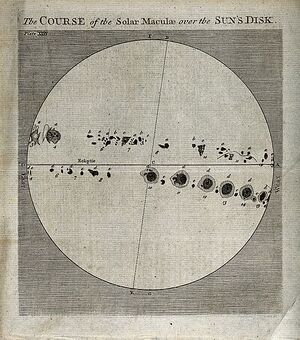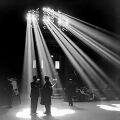Sunspot (nonfiction): Difference between revisions
No edit summary |
|||
| (3 intermediate revisions by the same user not shown) | |||
| Line 14: | Line 14: | ||
<gallery mode="traditional"> | <gallery mode="traditional"> | ||
File:Light 1943.jpg|link=Light (nonfiction)|[[Light (nonfiction)|Light beams]] reach Union Station untouched by war-era sunspots (1943). | |||
</gallery> | </gallery> | ||
| Line 23: | Line 24: | ||
* [[Light (nonfiction)]] | * [[Light (nonfiction)]] | ||
* [[George Ellery Hale (nonfiction)]] | |||
External links: | External links: | ||
| Line 28: | Line 30: | ||
* [https://en.wikipedia.org/wiki/Sunspot Sunspot] @ Wikipedia | * [https://en.wikipedia.org/wiki/Sunspot Sunspot] @ Wikipedia | ||
[[Category:Nonfiction (nonfiction)]] | [[Category:Nonfiction (nonfiction)]] | ||
[[Category:Light (nonfiction)]] | |||
Latest revision as of 19:59, 12 June 2017
Sunspots are temporary phenomena on the photosphere of the Sun that appear visibly as dark spots compared to surrounding regions.
They correspond to concentrations of magnetic field flux that inhibit convection and result in reduced surface temperature compared to the surrounding photosphere. Sunspots usually appear in pairs, with pair members of opposite magnetic polarity.
The number of sunspots varies according to the approximately 11-year solar cycle.
Individual sunspots may endure anywhere from a few days to a few months, but eventually decay.
Sunspots expand and contract as they move across the surface of the Sun with a size ranging from 16 kilometers (10 mi) to 160,000 kilometers (100,000 mi) in diameter.
The larger variety are visible from Earth without the aid of a telescope.
In the News
Light beams reach Union Station untouched by war-era sunspots (1943).
Fiction cross-reference
Nonfiction cross-reference
External links:
- Sunspot @ Wikipedia

